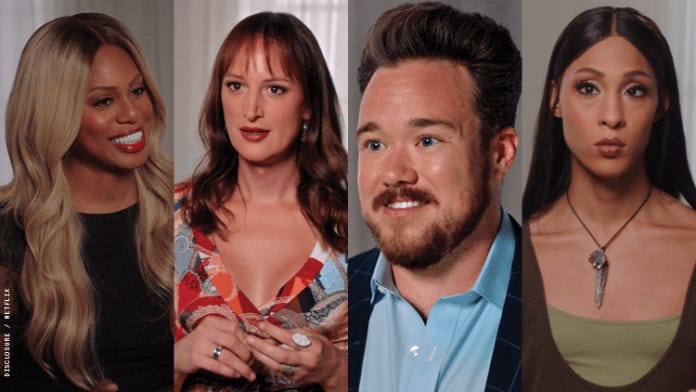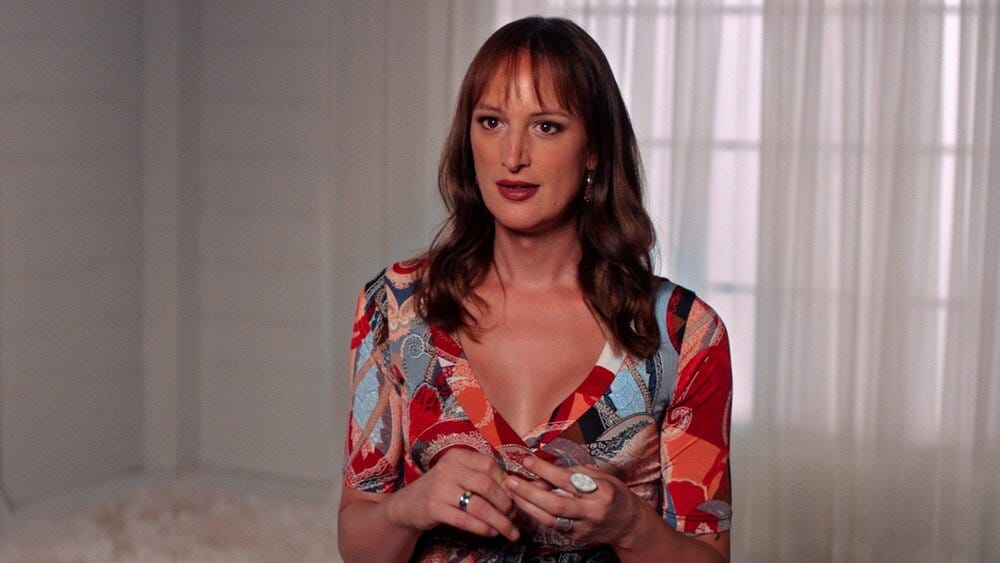disclosure
Documentary, 2020
Directed by: Sam Feder
Every now and then, you see something that changes your entire way of viewing the world. As a white, lesbian-identifying, non-binary person, how I do have a critical relationship with the trans experience? I know what it’s like to be mistaken for a man. I know what being an out queer person for 30 years feels like, but I don’t know what it feels like to be a pre- or post-op trans man or woman, and I will never know.
I do know that I want to understand, and I want to listen, and I want to amplify voices saying important things about this, in any small way I can. But it’s not my voice that needs to be heard, it’s theirs. If by writing this I can get you to immediately put down whatever you’re doing and listen to these voices, then that’s what I will do.
I’m hoping that from there you’ll do exactly what I’m trying to do, which is deliberately search of more trans voices, bringing appropriate critique to the ones who try to put shame on the trans experience, and bringing more positive trans experiences into my own cultural and personal life.
I treasure my trans friends, and I have been horrified in the past at what I saw in media depictions of trans people. This was especially true once I became critically aware, and I truly understood the impact that Hollywood representation makes in people’s lives.
Over the years we see these horrid media representations as individual events. We’re disgusted, yes, but we can just switch it off and move on. Trans people feel the accumulation of it, much like as a lesbian I felt the accumulation of negative lesbian and bisexual characters over the years. Only in documentaries like Disclosure where you see negative representations one after another in detail do you comprehend the sheer horror of it all.
Much like in The Celluloid Closet, which played a role in my early understanding of gay and lesbian history on film, Disclosure explains what cumulative damage this negative representation inflicts on the lives of trans people, and just as importantly, how it shapes society’s reactions to trans people.
Disclosure is transformative. I knew all of the movies and shows they talked about, but I was seeing it all again in a different light, through different eyes. That’s the purpose behind documentary filmmaking generally, but this… was powerful. Again, I don’t believe that after watching a 2-hour film that I now know what being trans feels like, that’s not what this is.
Mid-way through this documentary, where the subjects talk about the litany of Hollywood films where the standard reaction to the trans reveal is to vomit, I cried. I openly wept, not just at the insanity of it, but the knowledge of how many of these films were lauded, how many Oscar nominations handed out, how many times we watched things like it and didn’t give it the critical eye and backhand it deserved.
Bravo to the courageous trans men and women who spoke their truth to this invasive camera, who revisited this trauma, who had the sheer decency to step forward, take off a piece of the armor that protects them, and say we are here to put an end to this.
There’s nothing about this documentary I don’t love. I love the way the camera lingers on their reactions and takes no prisoners. I love the way the subjects are fierce in their criticism, while working through their own complex reactions to getting any kind of media representation at all. Again, much like gays and lesbians through the 80’s and 90’s, they cling to each and every moment of positivity they can get from what is on the screen, even if the overall message turns out to be toxic.
For instance, I watch the The L Word (original series) now, and I see how badly Max (Daniela Sea) was treated. At the time, Max was the only trans character as a regular on a mainstream TV show anywhere, so it’s amazing he was there at all! But still…it hurts. Even Queer as Folk, which I loved for it’s groundbreaking treatment of gay men, was generally not kind to the trans community.
It’s acknowledged here that the negative response has included this idea that transgender women are attempting to appropriate the spaces and experiences of women, and that this is harmful to “real” women struggling with the abuse and trauma they’ve gotten from men.
I reject this. Not the trauma women face which is so obviously real, but that trans women in women’s spaces somehow harms women. This is not like white people putting on blackface or appropriating the cultures of people of colour. Trans women ARE women, they don’t want to displace or harm women, they are trying to find places for their true selves. Plus they live under the same ridiculous standards of beauty and suffer the patriarchy as all women do, with the added bonus of trans otherness.
So many thoughts, so many feelings. So many things that were said that are so simple and complex at the same time that it blew my damn mind. So many hours of unpacking this that I’ve had to watch it again and again to take it all in.
I’m back to my original statement. This film changed my life and I don’t want to go back to the way I was before. Disclosure is vital viewing, not just for queer people, but for the population at large.



